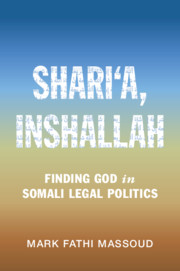Book contents
- Shari‘a, Inshallah
- Cambridge Studies in Law and Society
- Shari‘a, Inshallah
- Copyright page
- Dedication
- Contents
- Figures, Maps, and Tables
- Preface
- Acknowledgments
- Note on Places and Languages
- Additional material
- Introduction
- Chapter one Embracing Shari‘a and the Rule of Law
- Part I Colonialism and Its Aftermath, 1884–1991
- Part II Struggles of a Broken Nation, 1991–2021
- Chapter Four Restoring Shari‘a: Islamic Courts in a Shattered Somalia
- Chapter Five Integrating Shari‘a: Legal Politics in Somaliland
- Chapter Six Reclaiming Shari‘a: Women’s Activism in Somaliland
- Chapter Seven The Rule of Law, Inshallah
- Book part
- Bibliography
- Index
- Cambridge Studies in Law and Society
Chapter Seven - The Rule of Law, Inshallah
from Part II - Struggles of a Broken Nation, 1991–2021
Published online by Cambridge University Press: 13 May 2021
- Shari‘a, Inshallah
- Cambridge Studies in Law and Society
- Shari‘a, Inshallah
- Copyright page
- Dedication
- Contents
- Figures, Maps, and Tables
- Preface
- Acknowledgments
- Note on Places and Languages
- Additional material
- Introduction
- Chapter one Embracing Shari‘a and the Rule of Law
- Part I Colonialism and Its Aftermath, 1884–1991
- Part II Struggles of a Broken Nation, 1991–2021
- Chapter Four Restoring Shari‘a: Islamic Courts in a Shattered Somalia
- Chapter Five Integrating Shari‘a: Legal Politics in Somaliland
- Chapter Six Reclaiming Shari‘a: Women’s Activism in Somaliland
- Chapter Seven The Rule of Law, Inshallah
- Book part
- Bibliography
- Index
- Cambridge Studies in Law and Society
Summary
The president of Afghanistan, Ashraf Ghani, has called the rule of law the glue that binds state and society together. But this glue erodes easily. As the previous chapters have shown, practices and institutions associated with the rule of law are as broken, inconsistent, and discordant as the Horn of Africa’s many Islamic states and their colonial, authoritarian, and democratic architects have been. Throughout the Horn of Africa’s history, political elites – colonial administrators, democratically elected officials, authoritarian rulers, aqils, sultans, sheikhs, international lawyers, and foreign aid workers – have sought to resolve people’s disputes, write constitutions, draft laws, construct law schools, build prisons, and reform courts.
- Type
- Chapter
- Information
- Shari‘a, InshallahFinding God in Somali Legal Politics, pp. 289 - 309Publisher: Cambridge University PressPrint publication year: 2021

